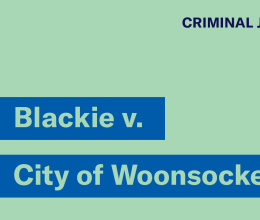In an important victory for the rights of medical marijuana patients in the state, R.I. Superior Court Judge Richard Licht today issued a preliminary injunction against a Smithfield ordinance that the ACLU argued was an attempt to undermine the state’s medical marijuana law by imposing significant burdens on patients’ access to treatment in conflict with state law. The decision establishes an important precedent because a number of other municipalities have adopted, or are considering adopting, similar troubling restrictions on the rights of medical marijuana patients, although Smithfield’s appeared to be the most egregious.
In its decision granting the injunction, the Court said that the plaintiffs had demonstrated that enforcement of the ordinance would cause “irreparable harm” by leading to the “unwarranted disclosure of Plaintiffs’ status as medical marijuana cardholders” contrary to state law, that Town interference in the state’s detailed medical marijuana system “could impair the public interest,” and that the hardships to the plaintiffs in terms of their “increased difficulty or inability to either grow or obtain their medicine” weighed in favor of issuing an injunction.
The Town’s ordinance, enacted in April, imposes a number of onerous constraints on the possession and growth of medical marijuana, despite, and directly contrary to, stringent regulations already in place under Rhode Island’s medical marijuana law. Among other restrictions, the ordinance limits the growing of medical marijuana to two mature plants and two seedlings, and only at a patient’s primary residence, even though state law specifically allows for the cultivation of 12 mature plants and outlines where medical marijuana can be grown.
The Smithfield ordinance further undermines the rights of patients by completely barring caregivers from growing medical marijuana for them anywhere in the town. The ordinance also requires patients to disclose their identity to a number of municipal authorities, which, the suit argues, is almost certain to undermine their right to confidentiality under the law.
The lawsuit, filed by ACLU of RI volunteer attorneys C. Alexander Chiulli, John Meara and Matthew Plain, is on behalf of two licensed medical marijuana patients – listed as Jane Does to protect their confidentiality – and the Rhode Island Patient Advocacy Coalition (RIPAC), a medical marijuana public education organization. Among other things, the suit argues that the ordinance infringes on patients’ rights as guaranteed by state law, unduly restricts access to treatment, harms patients’ privacy rights, and unjustly targets medical marijuana users – all in violation of Rhode Island state law. The suit sought an injunction barring Smithfield’s enforcement of the ordinance. The ACLU had previously urged the Town Council not to adopt the ordinance because of its adverse impact on local residents suffering from serious illnesses.
RIPAC director JoAnne Leppanen said today: “The Smithfield ordinance was based on misinformation and prejudice. It was enacted by a council more concerned with an anti-marijuana agenda than the health of its most fragile and vulnerable residents, the facts, or the law. It has inflicted stress, fear and suffering on law abiding patients struggling to cope with debilitating medical conditions. We are grateful that the town will now be required to abide by the state law.”
ACLU of RI volunteer attorney C. Alexander Chiulli added: “This decision confirms the legitimacy of Rhode Island’s medical marijuana program and, most importantly, the rights and protections it affords its participants. It sends a strong message that municipalities statewide must respect those rights.”
ACLU of RI executive director Steven Brown stated: “The ACLU is hopeful that this decision will encourage every other municipality considering adopting anti-medical marijuana ordinances to reconsider their plans.” Brown added that, in order to drive the message of the court’s decision home, the ACLU was considering filing suit against one of the other municipalities that presently has a similarly restrictive ordinance in conflict with the state’s medical marijuana law.
The court will hold further proceedings at some point in the future on the ACLU’s request to make the preliminary injunction permanent. In the meantime, the ACLU’s Brown said the organization would ask other municipalities to put any similar ordinances or planned ordinances on hold in light of today’s ruling.








